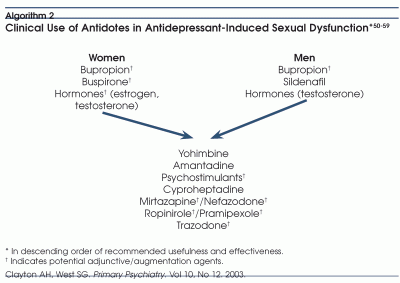Nelson Vergel
Founder, ExcelMale.com
In an open-label study of 1,022 patients with a mean 40 years of age, 59.1% reported antidepressant-associated sexual dysfunction.10 The study analyzed the following antidepressants: citalopram, paroxetine, venlafaxine, sertraline, fluvoxamine, fluoxetine, mirtazapine, nefazodone, amineptine, moclobemide, clomipramine, imipramine, maprotiline, phenelzine, and trazodone. Of those with sexual dysfunction attributed to antidepressants, 38.3% rated themselves as being concerned enough about sexual dysfunction to discontinue antidepressant therapy . Another 34.5% indicated that, although they did not intend to discontinue antidepressant therapy because of it, they and/or their partner were concerned or distressed about sexual dysfunction. That nearly 4 of 10 patients in this study were concerned enough about their sexual dysfunction to discontinue their antidepressant is worrisome in view of the fact that noncompliance with the therapeutic regimen may result in relapse or recurrence of depression.
Antidepressant-Associated Sexual Dysfunction: A Potentially Avoidable Therapeutic Challenge
Antidepressant-Associated Sexual Dysfunction: A Potentially Avoidable Therapeutic Challenge
Attachments
Last edited:



















